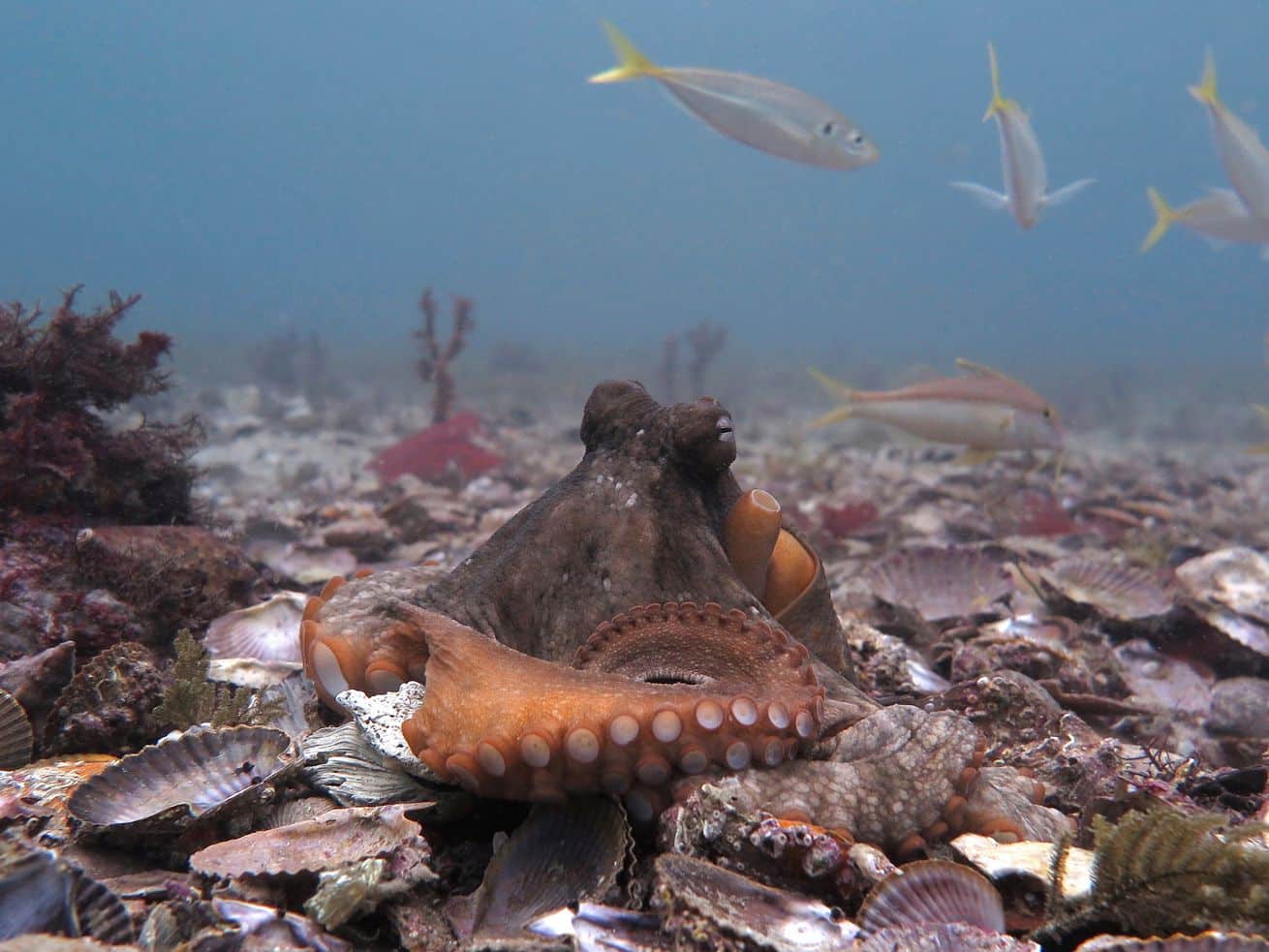Don’t annoy an octopus or you might get a face-full of silt.
In quiet waters south of Sydney, Australia, two octopuses are resting near each other on a bed of scallop shells. Then, seemingly without warning, one of them jets a stream of silt in the other’s face. Shrouded in cloudy water, the octopus that’s been hit inches back — like you might if someone hurled trash at you on a New York City sidewalk.
The interaction was caught on camera, as were dozens of similar behaviors that show octopuses launching debris in a jet of water. In a new preprint study based on the footage, which has yet to be peer-reviewed, scientists say these interactions reveal that octopuses “throw” things, sometimes at other octopuses or fish. In one case, the authors write, a female octopus repeatedly launches silt at a male that had been trying to mate with her.
These observations are a big deal because targeted throwing is rare in the animal kingdom, said Peter Godfrey-Smith, the study’s lead author and a professor of philosophy of science at the University of Sydney. Elephants, monkeys, and birds are among the few animals known to do it, but at times throwing has “been seen as distinctively human,” the authors write.
/cdn.vox-cdn.com/uploads/chorus_asset/file/22820039/giphy.gif) Courtesy of Peter Godfrey-Smith, David Scheel, Stephanie Chancellor, Stefan Linquist, and Matthew Lawrence
Courtesy of Peter Godfrey-Smith, David Scheel, Stephanie Chancellor, Stefan Linquist, and Matthew LawrenceBut some experts don’t see this behavior as throwing, per se, and question whether the animals actually aim to hit other creatures. “If they were throwing, they would pick stuff up with their arms and throw it,” said Jennifer Mather, a renowned octopus expert at Canada’s University of Lethbridge who was not part of the study. More likely, she suspects, the octopuses are just jetting water toward nuisances — a behavior we’ve known about for decades — and sometimes the water happens to have “crud” in it. It’s not explicitly a social behavior, she said.
In recent years, we’ve been utterly captivated by octopus intelligence, and studies that draw parallels between their behavior and our own have helped propel the animals to fame. It’s hard not to marvel at the idea of an octopus dreaming — or of a female rebuffing a male suitor, for that matter. But experts warn that we need to be careful when interpreting the results from studies like these because octopuses are nothing like us. In the end, we shouldn’t have to relate to an animal in order to respect it. It’s how they’re different from us that makes them so remarkable.
Octopuses sometimes shoot ink at scientists who study them
Studying octopuses can be dirty work. They have tube-shaped structures on their bodies, known as siphons, which expel water to help them move around. But clever as they are, they can also use those siphons to shoot water, or even ink, at things that annoy them — including scientists.
“They will squirt ink out of the water and soil your clothes,” said Frank Grasso, an octopus researcher at the City University of New York.
That’s right: When kept in a lab, octopuses are known to poke their bodies out of the water and squirt unsuspecting researchers. On at least one occasion, an octopus has stained Grasso’s clothes, he said. Piero Amodio, an octopus researcher in Naples, Italy, says the animals have squirted water at him hundreds of times. “They take aim,” he said.
The most remarkable example of this behavior sounds almost too mischievous to be true: In at least two aquariums, Godfrey-Smith has written, octopuses “have learned to turn off the lights by squirting jets of water at the bulbs when no one is watching, and short-circuiting the power supply.”
In the wild, octopus siphons also serve a variety of functions, Mather said. They use them to clear out debris from their dens, like a leaf-blower, and to discard food scraps. “If an octopus moves into a shelter that it thinks is a useful home, they’ll clean it out,” she said. They’ll also jet water at scavenging fish that follow them in search of leftovers, she said.
All of which is to say: We know octopuses use their siphons as water canons. But are they also deliberately arming those cannons with debris?
/cdn.vox-cdn.com/uploads/chorus_asset/file/22822310/octopolis.jpeg) Courtesy of Peter Godfrey-Smith
Courtesy of Peter Godfrey-SmithDo octopuses really throw objects at each other?
Octopuses are elusive creatures and difficult to spot in the wild — unless you find yourself in “Octopolis.”
Named by Godfrey-Smith, Octopolis is a small site off the coast of southeastern Australia that is home to an unusually high density of common Sydney octopuses (which are also known as gloomy octopuses). A few cameras at the site offer researchers a rare glimpse into interactions among these largely antisocial animals.
It’s footage from Octopolis that revealed the unusual siphon behavior with new clarity: Octopuses there commonly gather debris in their arms — silt, algae, or shells — “and then use the siphon to expel the material” up to several body lengths away, the authors write in the study.
/cdn.vox-cdn.com/uploads/chorus_asset/file/22820889/F1.large__1_.jpg) Peter Godfrey-Smith et al.
Peter Godfrey-Smith et al.To be sure, Godfrey-Smith acknowledges that “throw” is an imperfect term for describing the behavior. “Strictly speaking,” he said, “it’s just a very octopus-y way of propelling something.”
The researchers observed more than 100 such “throws” in less than 24 hours of footage from 2015. Often, the animals used their siphons to propel objects out of their dens or discard the remains of food, the authors write. But in many cases, they seemed to be launching debris toward a target.
Octopuses seem to target annoyances. Is it intentional?
In more than a dozen cases that the scientists observed, octopuses hit other octopuses with debris. The females tend to throw more than the males, said Godfrey-Smith, who is the author of Other Minds: The Octopus, the Sea, and the Deep Origins of Consciousness.
“You’ll have a female that does this a bunch of times at one male over a period of several hours,” he said. “By the end of it, he’s kind of ducking. It is quite amusing.”
In another example, a male octopus was “rebuffed in a mating attempt,” the authors write, and then proceeded to throw something of a tantrum: “He threw a shell, changed color, and appeared to accelerate his breathing.”
/cdn.vox-cdn.com/uploads/chorus_asset/file/22822339/giphy__1_.gif) Courtesy of Peter Godfrey-Smith, David Scheel, Stephanie Chancellor, Stefan Linquist, and Matthew Lawrence
Courtesy of Peter Godfrey-Smith, David Scheel, Stephanie Chancellor, Stefan Linquist, and Matthew LawrenceThe octopuses also threw debris toward fish and toward an underwater camera that was close to their dens, the authors write. Before some throws, the animals even seem to orient their bodies toward the target, according to the study.
The authors say these behaviors suggest that octopuses are capable of deliberately launching objects at other animals, perhaps with the intention of hitting them. “Octopuses can thus definitely be added to the shortlist of animals who regularly throw or propel objects, and provisionally added to the shorter list of those who direct their throws on other animals,” they wrote.
But Mather and other outside experts aren’t convinced that octopuses pick up an item to launch at a target. They could just be sweeping out their den, for example, and accidentally hit another octopus in the process.
Amodio, meanwhile, says it’s likely that octopuses do pick up debris for the purpose of launching — but he has doubts about “the intention to hit the other individual with the object.” They might just propel the object in the general direction of a nuisance, he said.
/cdn.vox-cdn.com/uploads/chorus_asset/file/22822373/GettyImages_549410991.jpg) Reinhard Dirscherl/ullstein bild via Getty Image
Reinhard Dirscherl/ullstein bild via Getty ImageGodfrey-Smith, for his part, acknowledges that it’s challenging to work out whether or not hits are intentional. Nonetheless, he’s convinced that octopuses are, in fact, targeting each other. When a female octopus is repeatedly launching junk at a male, it’s hard to see it any other way. “You don’t need to clean your den that much,” he said, and the male is “expecting to be hit because he’s ducking.”
Why we care if octopuses can throw objects at each other
Whether or not octopuses are intentionally hurling objects at each other — and whether or not we can really call it “throwing” — the study shows that octopuses can use their siphon in clever ways: to move debris, arrange a den, and perhaps even send a signal to other animals, including us.
Does that mean they’re even more intelligent than we thought?
The question itself is fraught, as it suggests that there’s some universal idea of what it means to be intelligent. In our assessment of animals, intelligence is often measured using a human yardstick, as the primatologist Frans de Waal writes in his book Are We Smart Enough to Know How Smart Animals Are? “Every species deals flexibly with the environment and develops solutions to the problems it poses,” he writes. “Each one does it differently.”
/cdn.vox-cdn.com/uploads/chorus_asset/file/22822368/GettyImages_635826712.jpg) David Fleetham/VW PICS/Universal Images Group via Getty Images
David Fleetham/VW PICS/Universal Images Group via Getty ImagesOctopuses, for one, are nothing like us. In fact, “when our two branches of the animal family tree diverged, backbones hadn’t been invented,” as Elizabeth Preston wrote in the New York Times. “It makes sense to be cautious when we guess what’s going on in these animals’ minds.”
There is a benefit to our obsession with octopus intelligence: We show them more respect and compassion, which has implications for wildlife conservation, experts say. “You probably won’t conserve what you don’t respect,” Mather says.
Then again, what makes octopuses so marvelous is just how different from us they are. Case in point: Each of their eight tentacles has roughly 300 suckers, and each of those can have as many as 10,000 or so sensory neurons, allowing them to perceive touch and taste. “It’s alien,” Grasso said. “It isn’t human.”
Author: Benji Jones
Read More



